When Chatham University began construction on their new, Eden Hall Campus in Pittsburgh—the first in the world built from the ground up for the study of sustainability—they were looking to minimize energy consumption throughout the campus. “Chatham wanted a design that would slash energy consumption for their ’zero energy‘ project and that would eventually produce more energy than it consumes,” says Larry Larkin, fluid handling sales manager, Combustion Services and Equipment Company. “One large consumer was the pumps that serve the solar collectors, radiant floor heating, soil heating and main heating loop. Additional pumps were targeted for the management of storm and waste water on-site to complement the “zero energy” requirement. The University also wanted a pump system they could monitor for energy consumption, speed and emissions on an ongoing basis.”

A large bank of solar photovoltaic collectors are used to provide power for lighting and pumps. Electrical consumption reduced by 80% by using Wilo ECM pumps.
The Solution
The suggested solution was Wilo Stratos pumps. Their electronic commutated motor (ECM) reduces energy consumption by up to 80 percent, and includes on-board diagnostic and data logger for monitoring, multiple control modules for integration with building management systems, non-volatile memory for data storage and three time higher starting torque than a standard circulator pump. “The beauty of the Wilo pump system is that the University has the opportunity to adjust the system for energy savings. Chatham can take a historical view of the pumps, not just for speed and consumption, but where energy can be saved and emissions reduced,” Larkin says.
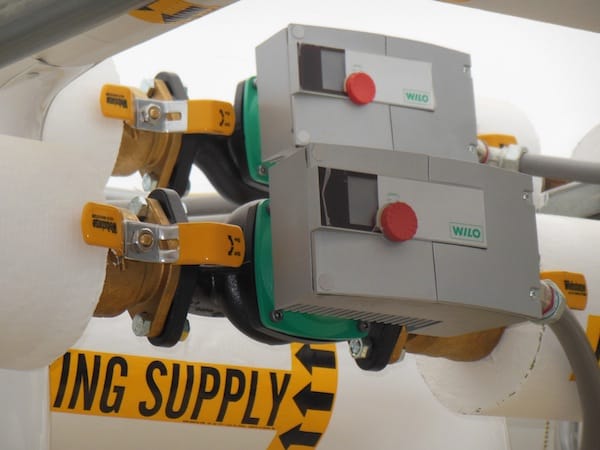
Wilo Stratos Pumps with ECM technology, a powerful onboard variable speed drive and flexible controller, was chosen for Chatham’s new Falk School of Sustainability.
Eden Hall Campus features a mix of energy generation methods that includes photovoltaic panels, solar collectors, low-velocity wind turbines, geothermal and micro-hydroelectric systems. According to Larkin, five new pumps are in operation—successfully serving the solar collectors, radiant floor heating, soil heating and the mail-heating loop.
Challenges
The primary challenge was to help slash energy consumption for this ‘zero energy” project. According to Chatham’s studies, regional buildings use an average of 168 kBTU/sf/yr, and Chatham is targeting 20 kBTU/sf/yr through better construction techniques, highly efficient lighting and the wise use of mechanical equipment, including pumps. Ultimately, the goal is to generate all energy requirements on site.
Initially, standard circulator pumps were in the specification as was purchasing auxiliary equipment like separate field mounted and wired; variable frequency drives. The variable speed drive, along with an advanced and flexible controller, comes standard with Wilo Stratos pumps to reduce the costs of installation.
“To meet the energy-saving challenge we asked: Why not put in pumps with EC motors that have integral on-board diagnostics and a data logger drive that could save cost and energy? We worked with the mechanical and electrical engineer/contractors to solve the problem with pumps that give the University a ’window‘ into the pump performance,” explains Larkin. “They can monitor and save energy, and lower emissions.” The Stratos pumps’ EC motor control eliminates noise pollution caused by excessive flow, is virtually maintenance free, and features a night setback mode when energy consumption is lowest. A 4-year warranty added to the value-added engineering.
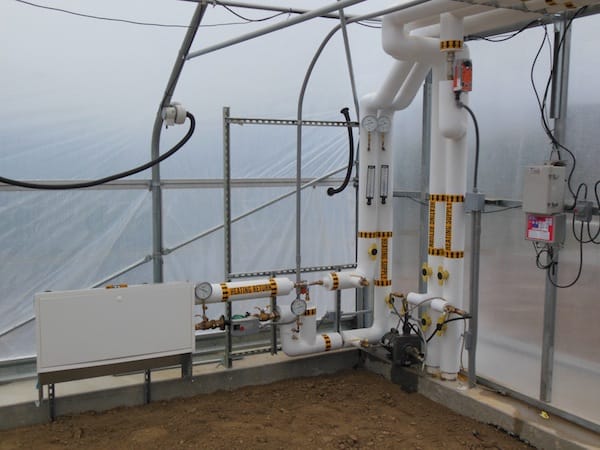
The Stratos pump helps maintain the soil temperature so that plants may be grown through-out the year.
In very low temperatures, a water/propylene glycol solution that circulates through the PEX tubing will become more viscous (thick and sticky). The Stratos EC motor delivers very high torque (even at start-up and very low speeds) to “push” the viscous fluid without overloading the motor.
Unlike conventional pumps, the Stratos doesn’t need a balancing valve, which saves energy while reducing installation time and costs. Instead, it is far more efficient, and better for the pump to reduce the speed. This is because the radial load on the pump bearings is reduced. Throttling a balancing valve on the discharge of a pump is like driving your car with the brake and gas pedal both depressed simultaneously. The Stratos enables you to release the brake and simply give it gas as needed.
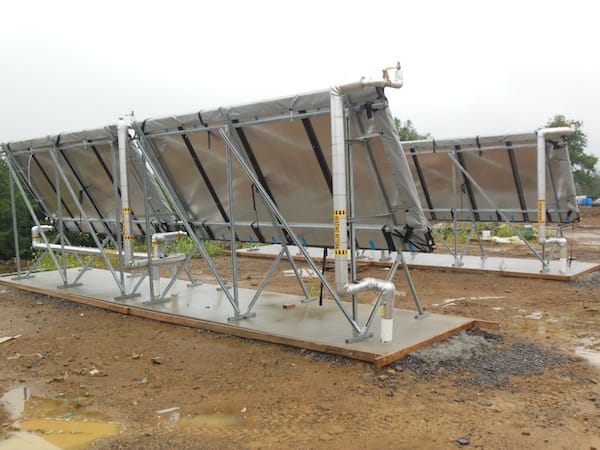
Two banks of solar collectors are used to heat water for the radiant and solar heating systems (shown with covers on).
Owner Feedback
Chatham University, an internationally recognized leader in sustainability, is more than pleased with the energy-saving performance and adjustability of their Wilo pumps.
The University expects to confront additional challenges throughout their 20-25 year master plan, and energy-efficient pumps will be part the solution. The Eden Hall Campus is the first in the world built from the ground up for the study of sustainable living, learning, and development and using the latest in environmentally responsible technology, design and innovation. Eden Hall continues to be self-sustaining in every way by producing zero carbon emissions and more energy than it consumes. It will one day serve more than 1,500 students and welcomes its first residential students in 2015.
Manufacturer/Model Name and Number
Five Wilo pumps were installed:
Stratos 1.25×3-30 – Heating Loop
Stratos 1.25×3-35 – Radiant Floor Heating
Stratos 1.25×3-35 – Soil Heating
Stratos 1.25×3-35 – Solar Collectors
Stratos 1.25×3-30 – Hot Water Tank System

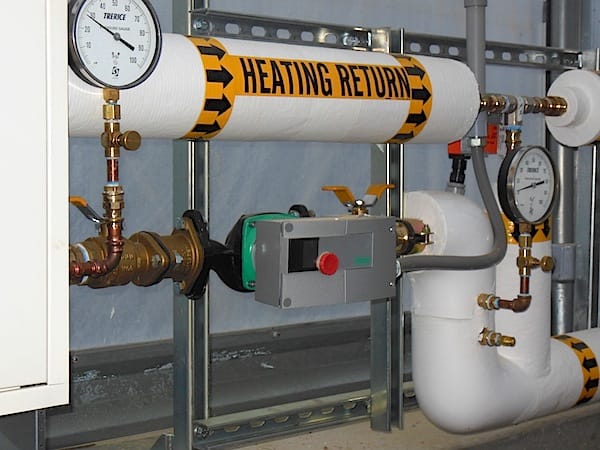


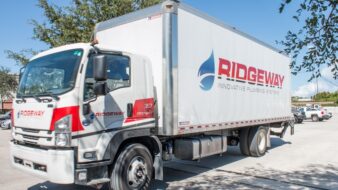
Join the conversation: